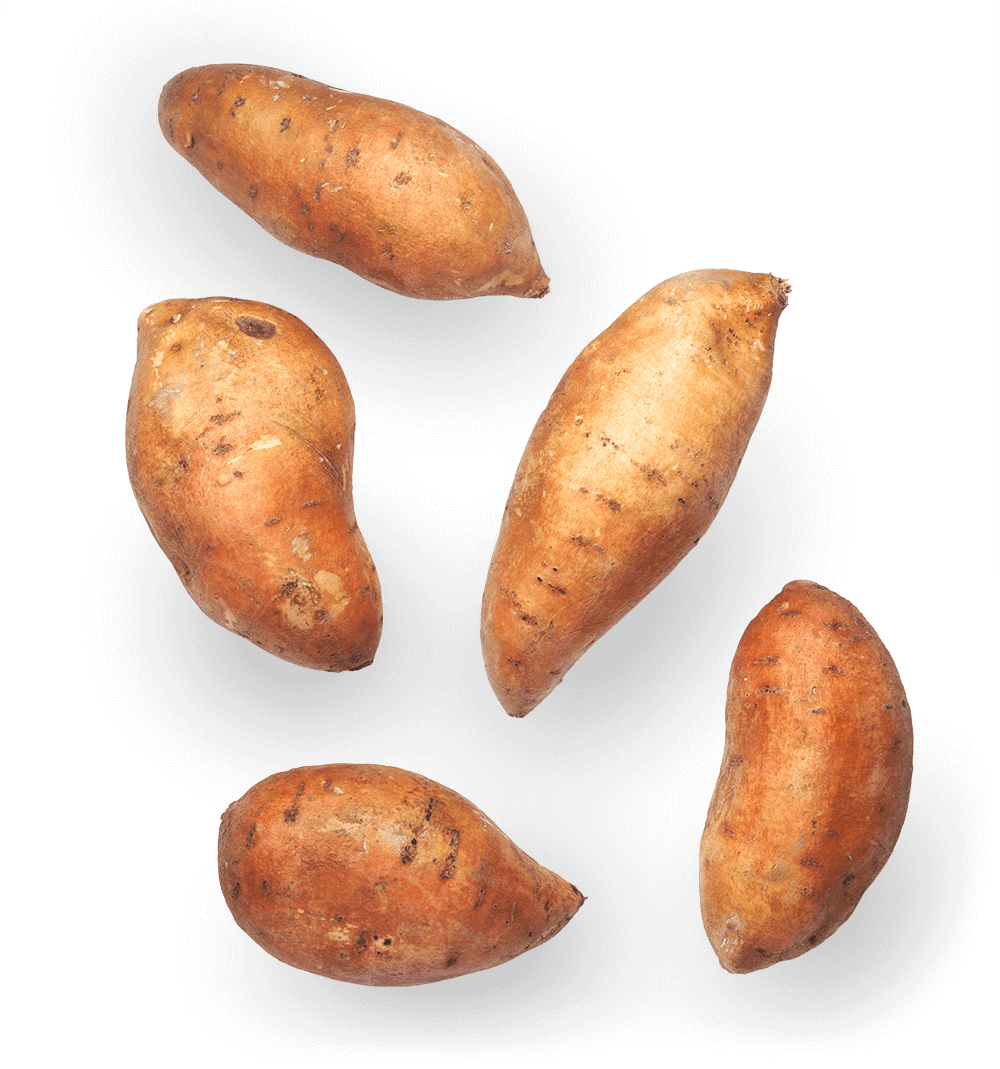Nutrition
Known for its versatility and sweet taste, sweetpotatoes have become a staple ingredient of many cuisines and their texture makes them perfect for use in savoury and sweet dishes. Not only are these one-of-a-kind root vegetables delicious and easy to add to your diet, they also offer a number of nutritional benefits.
Below, we cover everything you need to know about sweetpotato nutrition, from calories and macronutrients to vitamins, minerals, and health benefits!
Sweetpotato nutrition
The sweetpotato is a starchy, sweet-tasting root vegetable grown in nutrient dense soil, such as in North Carolina, and then exported and enjoyed all around the world.
In terms of nutrition, sweetpotatoes consist predominantly of carbohydrates and are almost completely fat free. They can be eaten with skin or peeled, with the former boasting even more nutritional value.
The table below shows the calories, macronutrients, vitamins, and minerals for a 100g portion, roughly equivalent to a small-sized sweetpotato.
| 111g baked sweetpotato |
Recommended daily intake |
|
| Calories | 100 | 5% |
| Fat | 0.2g | 0% |
| Carbohydrates | 23g | 9% |
| Sugars | 7.2g | 8% |
| Fibre | 3.7g | 12% |
| Protein | 2.2g | 4% |
| Salt | 0.5g | 9% |

Calories
When baked, an average-sized sweetpotato has about 100 calories. This is slightly less than white potatoes, making the food a good option for people looking to limit their calorie intake.

Fat
Sweetpotatoes are naturally low in fat and completely free from saturated fats. A 111g portion of baked sweetpotatoes has roughly 0.2g of fat.

Carbohydrates
Sweetpotatoes are mostly made up of complex carbohydrates, which are released at a steady pace for a sustained source of energy. Despite their name, sweetpotatoes are not considered a high-sugar food, having around 7.2g of sugar per 111g portion.

Protein
When baked, a typical sweetpotato has around 2.2g protein, accounting for around 4% of the average adult’s recommended daily intake. Most of the protein in sweetpotatoes comes from the unique protein sporamin.
Sweetpotatoes are naturally low in fat and completely free from saturated fats. As an excellent source of fibre, sweetpotatoes also support a healthy digestive system.

Fibre
Sweetpotatoes are known as a good source of fibre – a key substance for digestive health – having around 3.7g of fibre per 111g portion. With many people not having enough of this essential carbohydrate in their diet, sweetpotatoes offer a great way to increase fibre consumption.
If you’re looking to up your fibre intake, make sure to keep the skin on your sweetpotatoes, as this is where most of the fibre in the vegetable is stored.

Vitamins
Sweetpotatoes are a rich source of vitamin A, an essential nutrient that contributes to iron metabolism and immune function as well as the maintenance of healthy skin and vision.
The vegetable also provides vitamins C and B6, both of which play an important part in the function of both the nervous and immune systems and can also help to reduce tiredness.

Minerals
Along with providing several essential vitamins, sweetpotatoes also contain copper, potassium and manganese.
These minerals support key bodily functions like metabolism, muscle development and cell maintenance.

Glycaemic index
Sweetpotatoes are generally considered to have a medium glycaemic index, however this will vary depending on how the sweetpotato is cooked.
Whichever way the sweetpotato is prepared, it’s still likely to have a lower glycaemic index than a white potato, making it a better option for people who want to limit raising their blood sugar levels.
Sweetpotato Recipes
Now you know the nutritious benefits of adding North Carolina sweetpotatoes to your diet, you’re ready to start creating delicious, and nutritious, recipes featuring sweetpotatoes.
From starters and desserts to mains and cocktails, we have a sweetpotato recipe for every diet.

